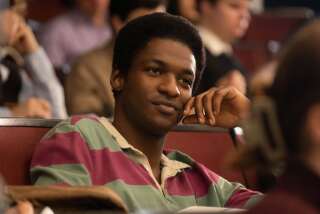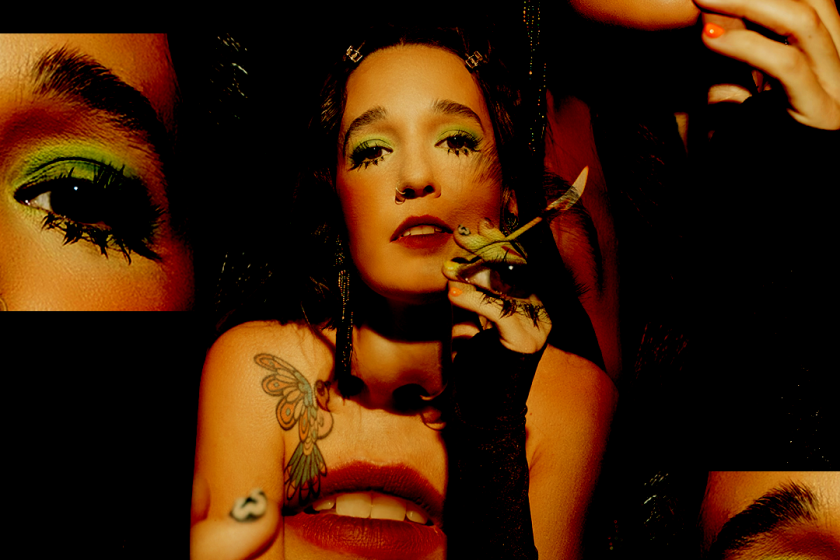The curious case of the star who isn’t there
- Share via
Here’s a question for Miramax Films. Even though critics rave about the powerful performance of Chiwetel Ejiofor in the mystery thriller “Dirty Pretty Things,” and the filmgoers who still pack theaters weeks after the film has been released rave about his performance, why is he the invisible man in the film’s marketing campaign?
The name of the film’s co-star Audrey Tautou, was emblazoned in big bold print on the marquee at the theater where I saw the film. Ejiofor’s name was not. Her picture was on the posters at the theater’s entrance. His wasn’t. Her face is in the print ads (including the one currently running in The Times) with a hairstyle that is not evident in the film. His isn’t.
The easy explanation is that Tautou is much better known to American audiences following her knockout performance in the highly acclaimed 2001 film “Amelie.”
This makes her, and the film, a much easier sell. In film marketing, of course, the name of the game is to stuff as many people as possible into theater seats. That means using every marketing tool available. A recognizable name, then, supposedly is the big draw.
The far more troubling answer, however, is that Ejiofor, the film’s real star, is not simply a screen newcomer, but also a black newcomer.
Miramax didn’t stop at exorcising him from the film’s promotional material; it also twisted the plot description to push Tautou to the center of the film’s action. The company’s official Web site declares that the film is about “one mysterious woman, one shocking discovery.”
Tautou’s character is neither mysterious nor does she make the shocking discovery in the film. She’s a Turkish emigre, and a single woman, who struggles in menial jobs against indifferent, even brutal bosses, to make a go of it in London. Her dream is to get to America.
It’s the Ejiofor character whose past is shrouded in mystery. It’s he, as a hotel desk clerk, who makes the “shocking discovery” of a human heart in the toilet in one of the rooms where he works.
From that discovery, “Dirty Pretty Things” spirals into a compelling story of mystery and intrigue. In the process, it offers filmgoers a candid glimpse into the poverty and governmental, racial and sexual victimization that many illegal immigrants face.
But above all, the film is one man’s tale of personal conflict, turmoil and, ultimately, self-realization. And that one man is Ejiofor.
In ignoring this, and shoving Ejiofor out of the promotional picture, Miramax insults moviegoers by assuming (A) that only whites would be interested in a provocative, character- and issues-driven film, and (B) that whites are so laced with latent bigotry that they would not pay to see a film with a black man in a leading role.
Miramax is dead wrong on both counts.
Nonwhite filmgoers buy a substantial number of movie tickets. And they don’t all go to see dumbed-down, action-filled or explicitly ethnic films. They also want to see thoughtful films that explore burning social issues.
Meanwhile, there is no evidence that whites balk at going to films that feature black, or nonwhite, performers in the leading roles, nor that they are reluctant to pack plays, musicals and concerts that feature black and nonwhite performers.
“Dirty Pretty Things” is a compelling, engrossing film that is a breath of fresh air in a summer in which Hollywood filled the screens with decidedly, and oftentimes embarrassing, conventional comedies, spoofs and action potboilers.
Unfortunately, Miramax polluted that air by denying Ejiofor the same acclaim in its off-screen promotion that filmgoers and critics gave him for his performance on the screen. It’s that racial blind spot that makes many still cast a wary and angry eye at Hollywood for its treatment of minorities.
*
Earl Ofari Hutchinson is the author of “The Crisis in Black and Black” (Middle Passage Press, 1998). He hosts a talk show on KPFK-FM (90.7),
Tuesdays, 7-8 p.m.
More to Read
The biggest entertainment stories
Get our big stories about Hollywood, film, television, music, arts, culture and more right in your inbox as soon as they publish.
You may occasionally receive promotional content from the Los Angeles Times.










